|
Dear Colleagues,
I am pleased to include another issue of RFS Briefings with some timely and encouraging updates on women in science.
Please continue to share important news and opportunities with us so that we may share it with you, and others who are committed to supporting the careers of exceptional women in science.
Stay safe and sound,

Karla Shepard Rubinger
Executive Director
Rosalind Franklin Society
www.rosalindfranklinsociety.org

The State of Biotech
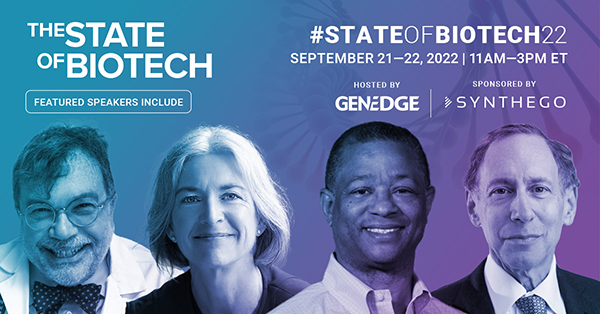
Join the Editors of GEN and an all-star line-up of speakers and presenters as they analyze the state of biotechnology circa 2022 – a celebration of innovation, emerging technologies, and clinical successes and an in-depth appraisal of the headwinds and challenges facing the industry. Read more.
Gina McCarthy, Biden’s top climate adviser, to step down.
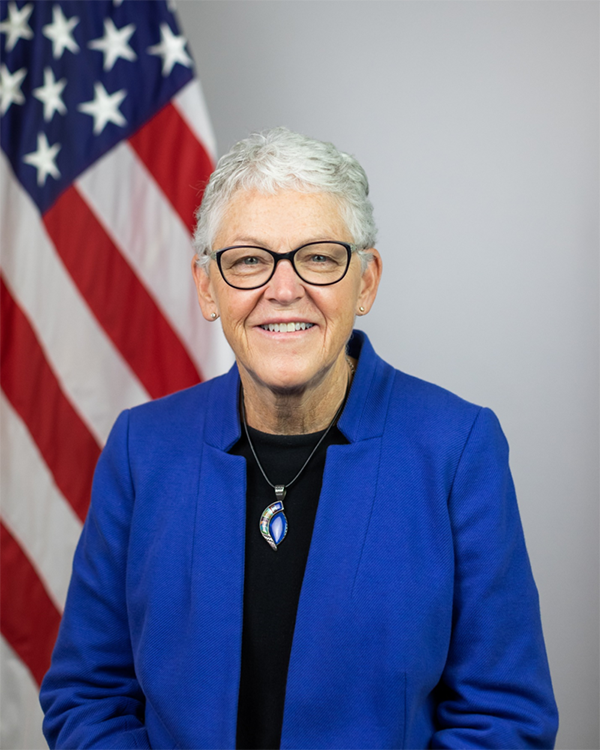
Gina McCarthy, President Biden’s top climate adviser, left her job on September 16, just weeks after the president signed a landmark climate bill to slow the pace of global warming. Gina McCarthy previously served as E.P.A. administrator in the Obama administration and had environmental roles under Republican governors. Read more. (Image: Wikipedia)
CRISPR pioneer Jennifer Doudna receives inaugural Kimberly Prize.
Northwestern University Feinberg School of Medicine and the Simpson Querrey Institute for Epigenetics announced that CRISPR pioneer and Nobel Laureate Jennifer Doudna is the recipient of the inaugural $250,000 Kimberly Prize in Biochemistry and Molecular Genetics. Doudna was selected for her fundamental biochemical studies providing molecular insight into the function of CRISPR/Cas9 systems as tools for genome editing and the application of her work to biology and medicine. RFS featured an engaging conversation last year with her which you can access here. Read more.
Athene Donald: why even great physicists like her suffer from impostor syndrome.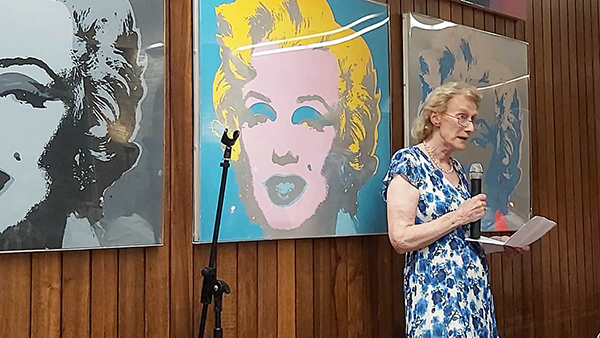
Dame Athene Donald recently admitted to suffering from impostor syndrome. “Yes, she had already established her physics credentials by the time I worked with her, but she was taking a massive risk as well by moving into uncharted, interdisciplinary waters. Being one of just a handful of women in what was then a highly male dominated department at the time didn’t help her confidence either,” writes Matin Durrani, editor-in-chief of Physics World. Read more. (Image by Matin Durrani)
Billion-dollar US health agency gets new chief — but its direction remains in limbo.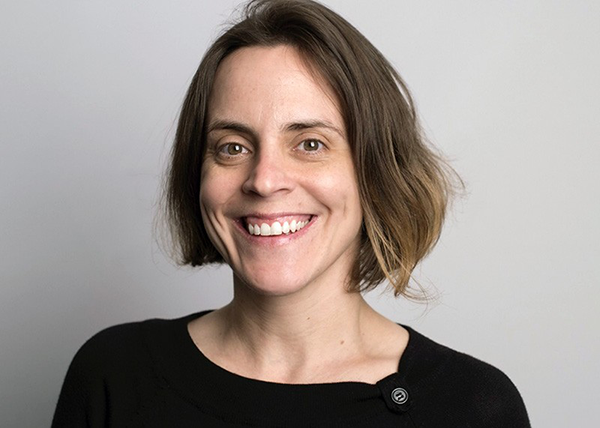
US President Joe Biden has selected Renee Wegrzyn, a biologist and former government scientist, as the inaugural director of the Advanced Research Projects Agency for Health (ARPA-H), an agency created by his administration to find innovative solutions to biomedical problems. “Renee possesses a rare combination of scientific expertise, practical experience and interpersonal skills that set her apart as a leader,” says Jennifer Doudna, who has served on a bioengineering advisory board with Wegrzyn. Read more. Image Credit: Ginkgo Bioworks.
Susan L. Solomon, crusader for stem cell research, dies at 71.
Susan L. Solomon, whose frustration over lags in finding a cure for her teenage son’s Type 1 diabetes prompted her to establish what became a leading independent stem cell research laboratory, died on Sept. 8 at her home in Amagansett, N.Y. She was 71. Read more.
Gender pay gap hits university faculty.
More women scientists work as professors today than at any time in history. But they’re still underpaid relative to their male colleagues with similar publication records, according to a study of more than 2300 science, technology, engineering, and math (STEM) faculty members. The findings are “concerning,” says Bruce Weinberg, a professor of economics at Ohio State University, Columbus. Read more.
Behavioral scientists have discovered the secret recipe for team success—gender diversity.
The study’s authors found that mixed-gender teams produced more novel and innovative work than all-women or all-men teams of comparable size, on average. Read more.
Men outnumber women by more than 2 to 1 in US federal science jobs.
Women hold just 29% of the 335,412 jobs in science, technology, engineering and mathematics (STEM) in the US federal government, according to a report published by the US Equal Employment Opportunity Commission (EEOC). The report is based on data from 2019. The gender disparity is even greater in supervisory and leadership roles, in which women occupy just 26% of positions. Read more.
“How we boosted the number of female faculty members at our institution”
Despite a small increase in the number of women studying STEM subjects as undergraduates or postgraduates in Australia, female enrolment in these fields was only 36% of the total in 2019. Female representation in science and engineering, especially at the senior level, is still appallingly low. Read more.
To encourage more scientists to translate their research, BioInnovation Institute (BII) and Science award the BII & Science Prize for Innovation.
Three winners will have their essays published in Science and will be invited into BII’s entrepreneurial ecosystem. In addition, the Grand Prize winner will receive a prize of USD 25,000 and each runner-up will receive USD 10,000 at a grand award ceremony in Copenhagen, Denmark. Read more.
Marianna Limas, Social Media Manager
Nilda Rivera, Partnership and Events Manager
|
|
|
Dear Colleagues,
I am pleased to include another issue of RFS Briefings with some timely and encouraging updates on women in science.
Please continue to share important news and opportunities with us so that we may share it with you, and others who are committed to supporting the careers of exceptional women in science.
Stay safe and sound,

Karla Shepard Rubinger
Executive Director
Rosalind Franklin Society
www.rosalindfranklinsociety.org

The State of Biotech.
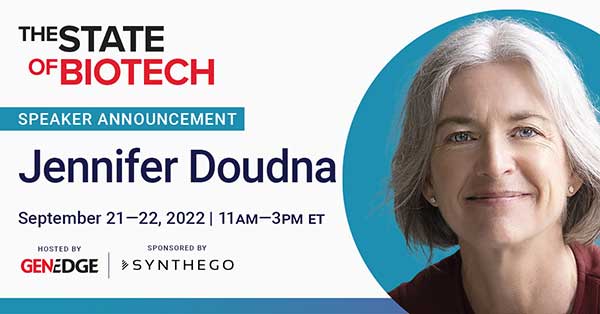
Join the Editors of GEN and an all-star line-up of speakers and presenters as they analyze the state of biotechnology circa 2022 – a celebration of innovation, emerging technologies, and clinical successes and an in-depth appraisal of the headwinds and challenges facing the industry. You may also access our recent interview with her and GEN editors here. Read more.
For Twist Bioscience CEO Emily Leproust, it’s ‘go big or go home’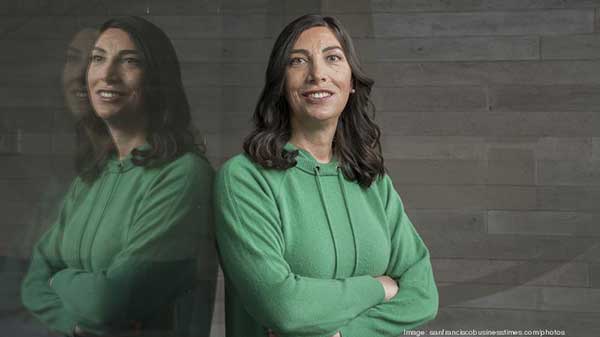
Emily Leproust, CEO and founder of Twist Bioscience, is passionate about mentoring the next generation of young aspiring entrepreneurs. “It’s extremely satisfying and people did it for me,” Leproust said. “There’s a big myth that you can’t schedule innovation, but you can,” Leproust said. “If you put a line in the sand, hire the best people, encourage them, give them all the tools they need, reward them and create the sense that with their work, we’re going to save the world, they can do it. It’s amazing.” Image: LiPo Ching | San Francisco Business Times. You may also view her recent RFS presentation here. Read more.
Caroline Juang: Blending art, science, and outreach.
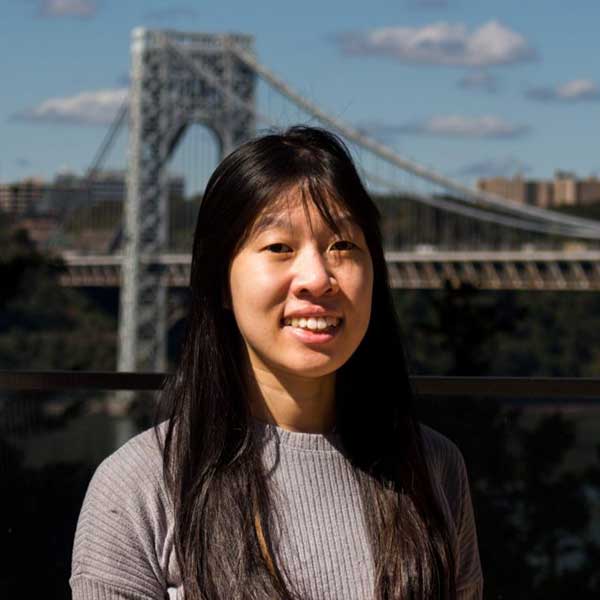
Caroline Juang is a PhD student at Columbia University who uses satellite data and other techniques to study climate hazards. She is also an artist and a STEM promoter. Although she still loves drawing cats and horror comics, lately she’s been centering Asian female astronauts in her artwork. Caroline hopes that by doing so, she can create sources of inspiration for others that she didn’t see as she was trying to imagine herself as a scientist while growing up. Read more.
25 early career scientists become HHMI Hanna Gray Fellows.

Through the Hanna H. Gray Fellows Program and related efforts, HHMI seeks to increase diversity in biomedical science by recruiting and retaining individuals from groups currently underrepresented in the life sciences and by creating inclusive environments in which all scientists can thrive. Read more.
Pfizer teams with historically Black university for new vaccine public health doctorate program.
Monica Ochapa is pursuing a doctorate of public health at the historically black university Morgan State. Beginning next week, Ochapa and her DrPH fellow Nguhemen Tingir will begin a two-year program that aims to create a path for more minority practitioners as leaders in vaccine medical development and translate research and analysis into real-world health solutions. Read more.
The case for gender-diverse research teams.
Study finds that male-female research teams produce more innovative, impactful research than all-male or all-female teams, and the more gender-balanced the diverse teams are, the better. Read more.
Novartis appoints Fiona Marshall, Ph.D., President of the Novartis Institutes for BioMedical Research as Jay Bradner, M.D., steps down from the Executive Committee of Novartis
Fiona Marshall said: “I am very excited to join Novartis and lead the discovery teams who are renowned for their collaborative research and use of cutting-edge technologies. I look forward to working with them, colleagues across Novartis and our partners across the biopharma ecosystem to accelerate the translation of scientific discoveries into breakthrough medicines that address critical areas of unmet need for patients.” Read more.
Out of the COVID storm emerges a winner in Eureka Prize 2022.
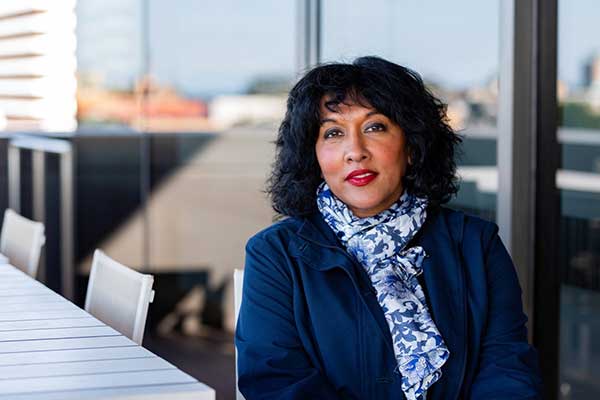
Professor Raina MacIntyre, winner of Eureka Prize for Leadership in Innovation and Science, said: “The pandemic has seen a rise in disinformation and an anti-science agenda. So when you are trying to stick to the science, speaking truth to power, it’s very very difficult when everyone else is pushing a different agenda.” (Image: Eureka) Read more.
Marianna Limas, Social Media Manager
Nilda Rivera, Partnership and Events Manager |
|
Dear Colleagues,
I am pleased to include another issue of RFS Briefings with some timely and encouraging updates on women in science.
Please continue to share important news and opportunities with us so that we may share it with you, and others who are committed to supporting the careers of exceptional women in science.
Stay safe and sound,

Karla Shepard Rubinger
Executive Director
Rosalind Franklin Society
www.rosalindfranklinsociety.org

Doris Duke Charitable Foundation announces the 2022 Clinical Scientist Development Awardees.
Sixteen early-career physician scientists receive more than $7.9M in grants for clinical research proposals that promise to have powerful impacts on a wide range of issues affecting human health. The awardee pool is also diverse in representation, with 53% of the selected projects led by women and 23% by those identifying as Black or Hispanic/Latinx. Read more.
How Nichelle Nichols changed the space program and recruited women and minorities to work at NASA.
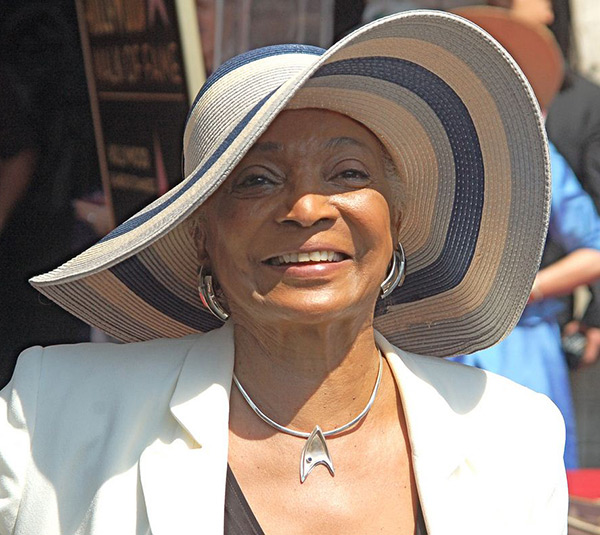
"Nichelle Nichols was a trailblazing actress, advocate and dear friend to NASA," NASA Administrator Bill Nelson said in a statement. "At a time when Black women were seldom seen on screen, Nichelle's portrayal as Nyota Uhura on Star Trek held a mirror up to America that strengthened civil rights." Read more. (Image by Wikipedia)
New exhibit puts girls in STEM, and the Kansas Children's Discovery Center on a national stage.
The Kansas Children's Discovery Center is one of just two U.S. children's museums selected to develop exhibits with grants from the IF/THEN Collection — "the largest free resource of its kind dedicated to increasing access to authentic and relatable images of real women in STEM." Read more.
Adam Neumann’s $350 million comeback is a ‘slap in the face’ to female founders and founders of color.
For Kathryn Finney, the news this week that Adam Neumann had raised $350 million from Andreessen Horowitz for his comeback venture Flow was “a slap in the face.” The sum, after all, is more than the $324 million raised by all U.S. Black-founded startups combined in the second quarter of this year. Read more.
Apply for the BII & Science Prize for Innovation.
To encourage more scientists to translate their research, BioInnovation Institute (BII) and Science collaborate to host an annual award. Through the BioInnovation Institute & Science Prize for Innovation, the editors of Science seek to recognize bold researchers who are asking fundamental questions at the intersection of the life sciences and entrepreneurship. Read more.
Two new books show how sexism still pervades astronomy.
Becoming an astronomer might seem straightforward. An awe of the night sky sparks a child to someday study astronomy in school, eventually leading to a graduate degree and a job in the field. But as two new books make clear, few women find the road so simple. Read more.
Norway bids to attract men to female-dominated university courses.
Experts say well-researched tools will be needed to draw more young men into medicine, psychology, dentistry and veterinary studies. Read more.
Humsa Venkatesh probes cancer’s grip on the brain.
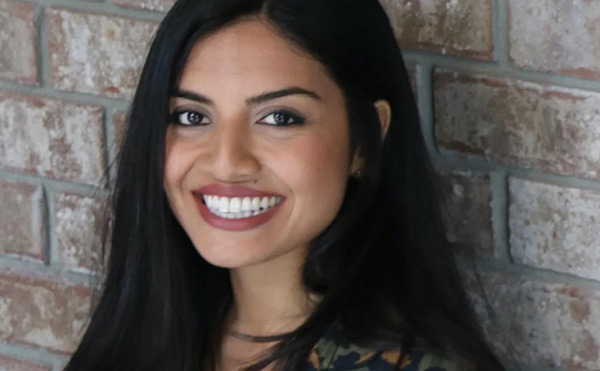
Humsa Venkatesh’s group extends neuroscience research beyond cancers originating in the brain, studying how peripheral neural circuits may influence cancer growth throughout the body, and whether these systems play a role when cancers metastasize to the brain. Read more. (Image by Saahil Mehra)
White House names Monica Bertagnolli as NCI Director.
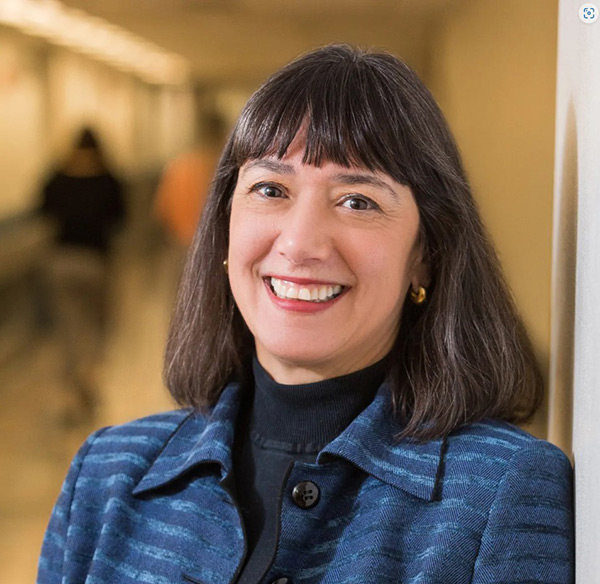
Monica Bertagnolli will become the first woman to lead the National Cancer Institute since its founding in 1937. Bertagnolli will also take over ongoing NCI efforts to increase grant funding, improve diversity in cancer research, and shrink cancer death rates among Black people. Read more. (Image by ASCO/Glenn Davenport)
Her discovery changed the world. How does she think we should use it?
Since 2012, Jennifer Doudna has become a leading voice in the conversation about how we might use CRISPR — uses that could, and probably will, include tweaking crops to become more drought resistant, curing genetically inheritable medical disorders and, most controversial, editing human embryos. She was also featured in a recent GEN/RFS webinar and her colleagues shared findings of their work on editing bacterial genes. Read more.
These women are leading the charge for more diversity in STEM.
Over the last 18 months, Arizona State University has hired four women to head units in STEM-related areas: Tijana Rajh, Donatella Danielli, Patricia Rankin, chair of the Department of Physics, and, most recently, Nancy Manley as director of the School of Life Sciences. Read more.
Marianna Limas, Social Media Manager
Nilda Rivera, Partnership and Events Manager
|
|
Dear Colleagues,
I am pleased to include another issue of RFS Briefings with some timely and encouraging updates on women in science.
Please continue to share important news and opportunities with us so that we may share it with you, and others who are committed to supporting the careers of exceptional women in science.
Stay safe and sound,

Karla Shepard Rubinger
Executive Director
Rosalind Franklin Society
www.rosalindfranklinsociety.org

RFS Awards in Science recognize outstanding contributions from women and minorities

The 2021 Rosalind Franklin Society (RFS) Awards in Science, recognizing outstanding published peer-reviewed research by women and underrepresented minorities in STEM, were released last week. The anthology of award winners is available digitally on the Rosalind Franklin Society website as well as in print. RFS, in partnership with Mary Ann Liebert Inc., launched this prestigious annual award for the best paper by a woman or under-represented minority in science in each of the publisher’s 100 peer-reviewed journals with the goal of highlighting the important contributions of these scientists and providing role models and mentors for younger scientists following in their footsteps. Read more.
Congratulations to Lyda Hill (one of our generous donors) and the 2022 Carnegie Medal of Philanthropy and Carnegie Catalyst Award recipients!
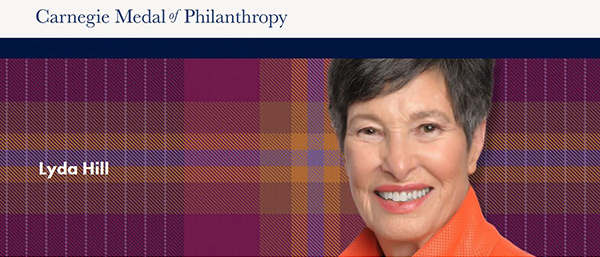
Lyda Hill was selected by the international family of Carnegie institutions for investments in the life sciences, including cancer and mental health research and treatment; conservation; supporting women in STEM fields and inspiring girls to be interested in STEM careers; and empowering community-based nonprofits to maximize impact. Read more.
The Michelson Philanthropies & Science Prize for Immunology.
Apply today for the Michelson Philanthropies and Science Prize for Immunology! This international prize supports investigators 35 and younger, who apply their expertise to research that has a lasting impact on vaccine development and immunotherapy. Read more.
Mentorship strategies to boost diversity in paleontology.
Drawing on research as well as their experiences as women of color in paleontology, Aja Carter and Erynn Johnson coauthored a paper offering advice for making the field more inclusive. In a new perspective piece in the paleontology section of the journal Frontiers in Ecology and Evolution, they draw attention to the lack of diversity in their chosen field and offer concrete advice for how to address it through effective mentorship. Read more.
NSF's Alan T Waterman Award Call for Nominations Info Session 2022.
NSF is seeking nominations for exceptional candidates that represent the diversity of the United States. Nominations for the 2023 Alan T Waterman Award are accepted from July 18 to September 16, 2022. Read more.
Postdoctoral Research Fellowships in Biology (PRFB).
The fellowships encourage independence at an early stage of the research career to permit Fellows to pursue their research and training goals in the most appropriate research locations. Read more.
The many versions of a female scientist.
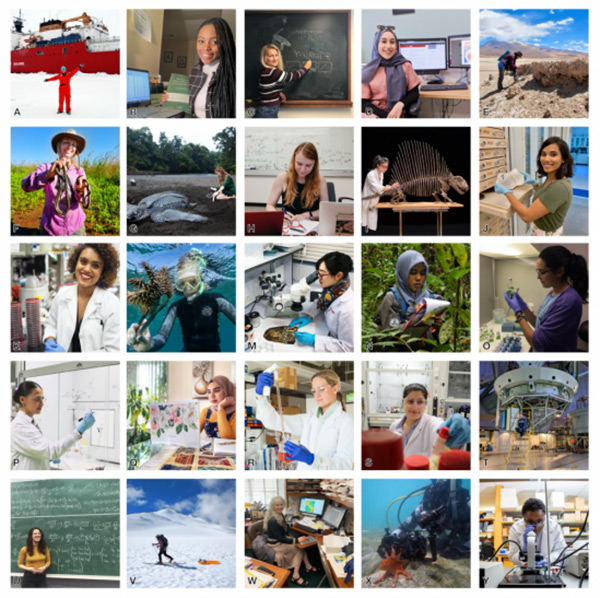
In 2018, while pursuing her doctoral degree in organic geochemistry at the California Institute of Technology, Alexandra Phillips turned to Instagram and started Women Doing Science, a site that features photos and profiles of female scientists all over the world in their elements, be they labs, lecture halls or the field. Read more.
There are too few women in computer science and engineering.
Only 20 percent of computer science and 22 percent of engineering undergraduate degrees in the U.S. go to women. Identifying the factors causing women’s underrepresentation is the first step towards remedies. Why are so few women entering these fields? Read more.
IMSE Annual Lecture: Electrochemistry for Green Energy Technologies.
The Institute for Molecular Science and Engineering at Imperial College London presented their fourth Dr Theo George Wilson Annual Lecture which was given by Professor Sossina Haile, Northwestern University. Read more.
HHMI Awards 51 new Gilliam ffellowships to advance diversity and inclusion in science.

HHMI announced the 2022 Gilliam Fellows and their advisers! These 51 adviser-student pairs will join the larger Gilliam community committed to advancing science through diversity and inclusion. The Gilliam Program invests in graduate students from populations historically excluded and underrepresented in science so that they are prepared to become scientific leaders. Read more. (Image: Gilliam Fellows at their 2019 annual meeting at HHMI headquarters. Credit: Hadar Goren)
The world’s most gender-diverse corporation credits childcare as its key to success.
One of Europe’s best capitalized and top performing banks was also named the world’s most gender diverse corporation. DNB ASA, Norway’s biggest bank, achieved the highest score for equality between the sexes of all corporations in the Equileap Gender Equality Global Report & Ranking of 2021. Read more.
Marianna Limas, Social Media Manager
Nilda Rivera, Partnership and Events Manager
|
|
Dear Colleagues,
I am pleased to include another issue of RFS Briefings with some timely and encouraging updates on women in science.
The Genome Writers Guild (GWG) and Rosalind Franklin Society have joined forces again to recognize amazing scientists by awarding the Rosalind Franklin Medal. This award marries together GWG’s core objectives of facilitating genome writing conversation, collaboration, and exposure with the Rosalind Franklin Society’s goals of enabling more women to achieve higher recognition, visibility, appointments and success in industry, academia, or government. The recipient of this award embodies the missions of both organizations.
Congratulations to the Rosalind Franklin Medal 2022 Awardee, Dr. Leslie Mitchell:
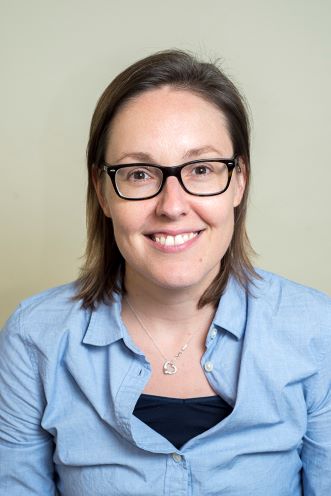
A co-founder of Neochromosome, Inc., a biotechnology company enabling biological engineering at genome-scale. Prior to Neo, Leslie was a post-doc at New York University Langone Health and worked extensively on chromosome and genome engineering in both yeast and mammalian systems and helped lead the international Synthetic Yeast Genome Project, Sc2.0, aiming to build a designer yeast genome from scratch. Leslie completed her PhD in systems biology at the University of Ottawa in Canada.
Congratulations to the Rosalind Franklin Medal 2022 Runner-Up: Dr. Betül Kaçar:
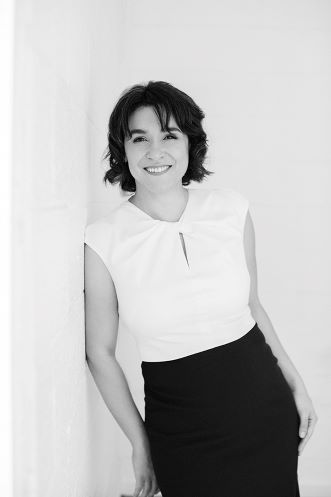
An assistant professor at the University of Wisconsin-Madison in the Department of Bacteriology. She received her Ph.D. in Biomolecular Chemistry from Emory University, and completed her postdoctoral studies at NASA Astrobiology Institute and Harvard University on Origins of Life and Evolutionary Biology. Her research group investigates the coevolution of cellular life and environment in lifeforms extinct and extant, using experimental systems. Dr. Kaçar received the Stanley Miller Early Career Award and the NASA Early Career Award. In 2022, she was selected to direct a new NASA-funded multimillion-dollar astrobiology research center focusing on life’s early evolution with emphasis on the natural selection elements over geologic time and to co-lead NASA’s new research coordination network on early cellular life. She has partnered with the UN Women Generation Equality Campaign to support education of girls and women globally. Asteroid 284919 Kaçar, discovered by astronomers using the NASA WISE space telescope, was named in her honor.
Please continue to share important news and opportunities with us so that we may share it with you, and others who are committed to supporting the careers of exceptional women in science.
Stay safe and sound,

Karla Shepard Rubinger
Executive Director
Rosalind Franklin Society
www.rosalindfranklinsociety.org

Biden taps prominent Harvard cancer surgeon to head National Cancer Institute.
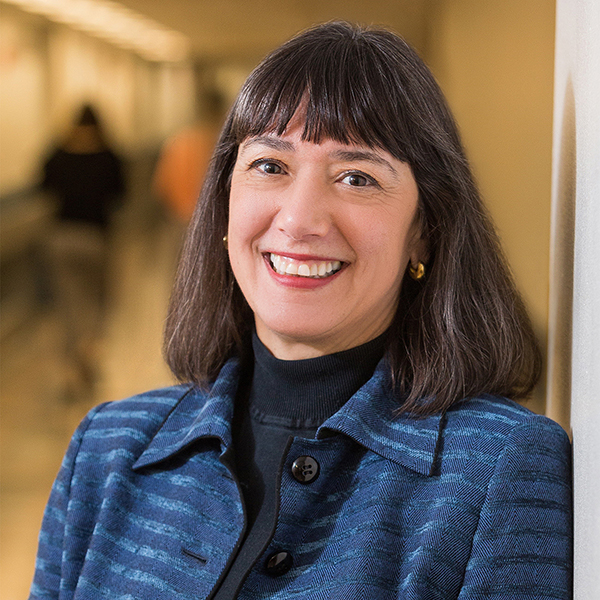
President Joe Biden has selected cancer surgeon Monica Bertagnolli as the next director of the National Cancer Institute (NCI). One of Bertagnolli’s first tasks will be to shape NCI’s role in Biden’s reignited Cancer Moonshot, which aims to slash the U.S. cancer death rate in half within 25 years. Bertagnolli will also head NCI efforts already underway to boost grant funding rates, diversify the cancer research workplace, and reduce higher death rates for Black people with cancer. Read more. (Image: ASCO; Glenn Davenport, Science)
Meet the Ukrainian number theorist who won math’s highest honor.
On July 5, Maryna Viazovska accepted her Fields Medal at the International Congress of Mathematicians in Helsinki, Finland. At the ceremony, the IMU cited Viazovska’s many mathematical accomplishments, in particular her proof that an arrangement called the E8 lattice is the densest packing of spheres in eight dimensions. She is just the second woman to receive this honor in the medal’s 86-year history. Read more.
Joyce C. Lashof, doctor who shattered glass ceilings, dies at 96.
Dr. Joyce C. Lashof, who fought for health equity and broke barriers as the first woman to head a state public health department, died on June 4 at an assisted living community in Berkeley. “From the start, her work in medicine and public health was deeply animated by a profound commitment to issues of social justice in our society,” said Nancy Krieger, a professor of social epidemiology at Harvard. “That included issues around racism, that included issues around social class, that included issues around gender.” Read more.
The explosive ambitions of Kate the Chemist.
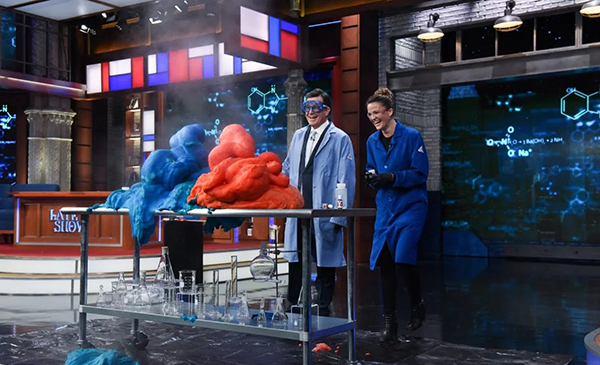
Kate Biberdorf, a professor at the University of Texas at Austin, has appeared on NBC’s “Today,” “The Late Show With Stephen Colbert” and other programs with color-changing chemicals, magnetic slime and bright, loud bangs. Dr. Biberdorf said she owed her passion for chemistry to her high school chemistry teacher. “My dream, truthfully, is to be her for the next generation of kids,” she said. Read more. Image by Kate the Chemist.
Meet the woman who makes the James Webb space telescope work.
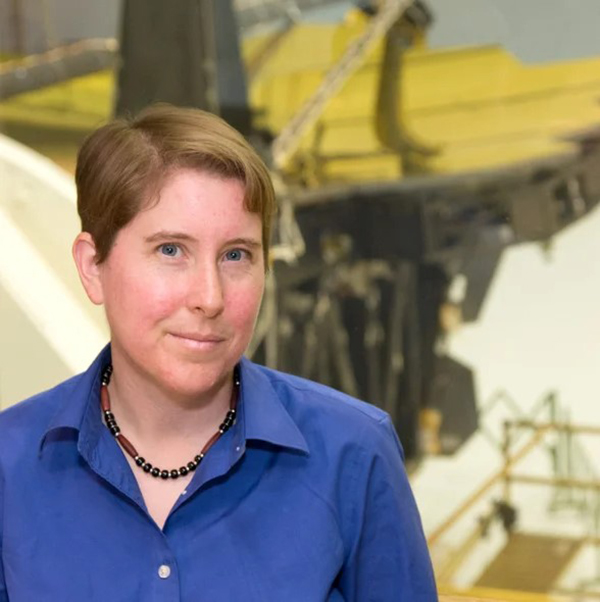
“Give me a telescope, and I can come up with something good to do with it,” says Jane Rigby, an astrophysicist at NASA’s Goddard Space Flight Center who serves as the agency’s operations project scientist for the $10-billion James Webb Space Telescope, the largest and most powerful off-world observatory yet built by humankind. Image credit: NASA/David P. Friedlander. Read more.
Early-career research fellowship opportunity! Application deadline: August 24, 2022.
The Education Research track goal focuses on contributing to the advancement of K-12 educational equity related to science and environmental literacy in the Gulf of Mexico region or Alaska by considering the recent impact of disasters on educational opportunities for students in vulnerable communities. Read more.
Nature science icon Jane Goodall gets special Barbie made from recycled plastics.
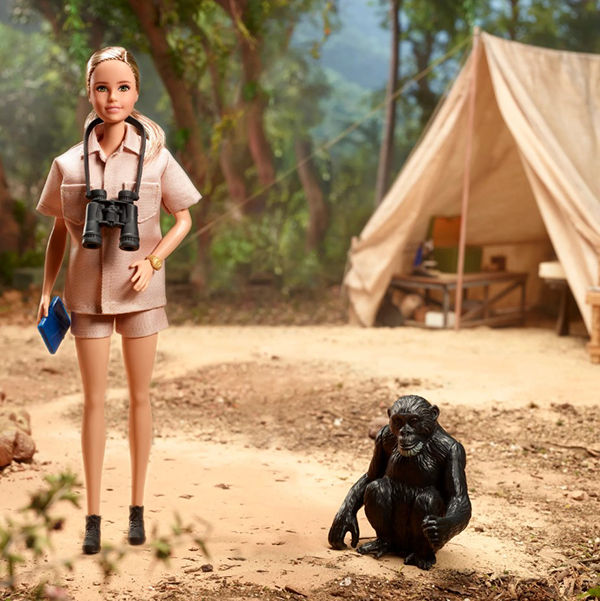
“Kids need more role models like Dr. Jane Goodall," said Lisa McKnight, Mattel's executive vice president and global head of Barbie and dolls, said in a statement. "We hope that this collection and homage to a groundbreaking pioneer for women in science and conservation inspires kids to learn more about green careers, how they can protect the planet, and act out sustainable stories through doll play.” Read more. Image: Mattel.
Arnold P. Gold Foundation is looking for a new CEO.
The Arnold P. Gold Foundation (Gold Foundation), the nation’s premier advocate for humanism in healthcare, invites applications and nominations for the role of President and Chief Executive Officer (President). Read more.
The engineer who teaches our bodies to heal themselves.
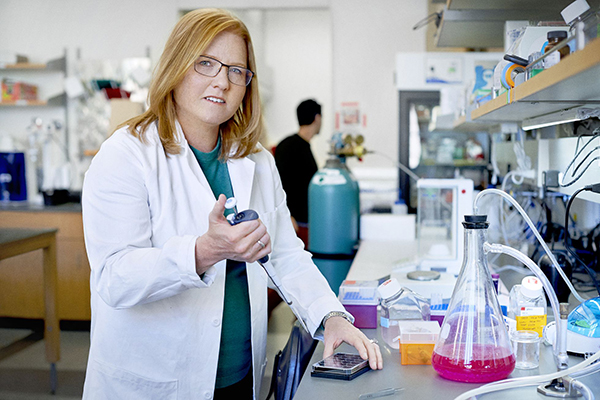
“Biomaterials can play a key role in helping our bodies heal themselves,” said Kristi Anseth, who received the 2020 L’Oréal-UNESCO For Women in Science international award in late June. In an interview with EL PAÍS, the researcher who specializes in regenerative medicine and tissue engineering, and also designs synthetic materials that imitate our tissues, said, “We are using materials designed for textile products like mattresses or clothing, and making them interact with the human body.” Read more. Image: EL PAÍS.
2022-2023 Gold Humanism Scholars at the Harvard Macy Institute.
The Arnold P. Gold Foundation announced the 2022-2023 Gold Humanism Scholars at the Harvard Macy Institute Program for Educators:
- Erica J. Harris, MD, of Einstein Healthcare Network, whose project focuses on developing an “innovative trauma informed care curriculum for diverse learners in an urban emergency department”
- Jasmine R. Marcelin, MD, FACP, FIDSA, of the University of Nebraska Medical Center (UNMC), whose project “JEDI with Jasmine” focuses on “building trust through developing inclusive spaces to discuss principles of justice, equity, diversity, and inclusion in healthcare for internal medicine residents and faculty”
- David Ansari, PhD, of the University of Illinois College of Medicine at Chicago, whose project will focus on “developing a library of clinical scenarios for the First Death program using technology- and human-based simulation.” Read more.
The astrophysicist who sculpts stars before they are born.
“As both an artist and an astronomer, you have to be a careful observer of what’s happening in nature and really try to understand what things look like. I think that my affinity for images and my desire to visualize things definitely feed into my scientific curiosity. After all, astronomy is really the science of light and images,” says Nia Imara, an astrophysicist at the University of California, Santa Cruz. Read more.
Four researchers with MIT ties earn Schmidt Science Fellowships.
Four researchers, 3 of whom are women, with MIT ties — Juncal Arbelaiz, Xiangkun (Elvis) Cao, Sandya Subramanian, and Hannah Zlotnick ’17 — have been honored with competitive Schmidt Science Fellowships. The four MIT-affiliated researchers are among 29 Schmidt Science Fellows from around the world who will receive postdoctoral support for either one or two years with an annual stipend of $100,000, along with individualized mentoring and participation in the program’s Global Meeting Series. Read more.
Marianna Limas, Social Media Manager
Nilda Rivera, Partnership and Events Manager
|
|
|